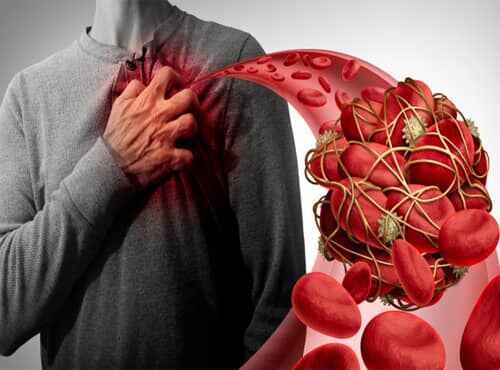What happens during atrial fibrillation?
Usually, the heart contracts and relaxes to a normal heartbeat. In atrial fibrillation, the upper chambers of the heart (the atria) beat a little faster than normal to move blood into the ventricles.
If a clot pulls off, it may enter the bloodstream and move to an artery leading to a brain stroke. More than 20% of people who get strokes have heart arrhythmia as the cause of loss. This is the reason why patients with atrial fibrillation are recommended blood thinners.
Atrial fibrillation is risky not only for your heart but the brain as well. In many patients, potential comorbidity has been a brain stroke which makes AFib a serious health concern.
Signs and Symptoms
Atrial fibrillation often shows no signs. Those who get it usually notice:
- feeling like your heart is skipping a beat, beating too fast
- chest pain
- fatigue
- weakness
- breathlessness
- dizziness
- lightheadedness
- fainting
- confusion
- intolerance to exercise
The intensity of the signs depends on the severity of your health condition. Some of these signs are mistaken for other conditions, and people may have no idea about what they are actually going through.
For instance, paroxysmal AFib, a type of atrial fibrillation that can be addressed on its own without any medical intervention. But you still need medicines to prevent future complications.
The signs may last from minutes to a few hours at a time. If symptoms persist for days, you may need an immediate medical emergency, as it is called chronic AFib.
Atrial fibrillation can be:
- Occasional. Occasional atrial fibrillation may have signs that last from a few minutes to hours. Sometimes, signs can be witnessed for a prolonged week and happen repeatedly. You may need treatment if symptoms keep on coming.
- Persistent. If you have persistent AFib, your symptoms will not get better, and the heartbeat does not go back to normal on its own.
- Long-standing persistent. This type of atrial fibrillation is continuous and lasts longer than a year.
- Permanent. The heartbeat does not return to normal, while you may need ayurvedic medications to manage heart rate and prevent blood clots.
Causes
Atrial fibrillation is an irregular and or rapid heart rate. The heart rate when you have atrial fibrillation may range from 100 to 175, while normally, it is 60 to 100 beats per minute.
Mostly, it is the abnormal heart structure that leads to atrial fibrillation. Other possible causes may include:
- High blood pressure
- Abnormal heart valves
- Heart attack
- Coronary artery disease
- Previous heart surgery
- Heart defects you're born with
- An overactive thyroid gland
- Exposure to stimulants, caffeine, tobacco or alcohol
- Prolonged use of medications
- Sick sinus syndrome is the inability of the heart's natural pacemaker to create a heart rate
- Lung diseases
- Viral infections
- Stress
- Sleep apnea
Ayurvedic treatment for fibrillation
Ayurveda offers treatment to support the function of the heart. This remedial science focuses on the use of herbs, a Satvik diet, yoga, and breathing exercises that can improve the heart's function.
As per Ayurveda, any ailment in the body is a result of imbalance doshas. Doshas help attain optimum health while their imbalance may lead to malfunctioning. Aggravated Vata can be irregular, so it leads to irregular heartbeats. Pitta is also aggravated, which causes the heart to beat at a faster rate. Slow Kapha can make the heartbeat at a slower pace.
Those with atrial fibrillation can take natural treatment after consultation from their ayurvedic physicians. Treatment is inclusive of herbal concoctions, therapies and procedures to pacify the imbalanced dosha and eliminate the toxins in the body and protect the body against the damage.
Preventive measures you can take to avoid your risk of serious health issues.
- Consume a healthy diet having plenty of vegetables, fruits, and whole grains
- Stay physically active and keep a healthy weight
- Avoid smoke or alcohol
- Prefer meditation, exercise, and yoga
- Avoid the use of caffeine
- Work on your stress levels as stress and anger can cause heart rhythm problems
- Limit the use of medications for cough, cold, fever that may trigger an irregular heartbeat and heart-related problems
At AyuKarma, we are committed to taking care of our patients with the help of a diet and herbal medicines. Our treatment is purely authentic and helpful to the patients undergoing any sort of heart-related problem.
For more information on this, get to us at AyuKarma.


